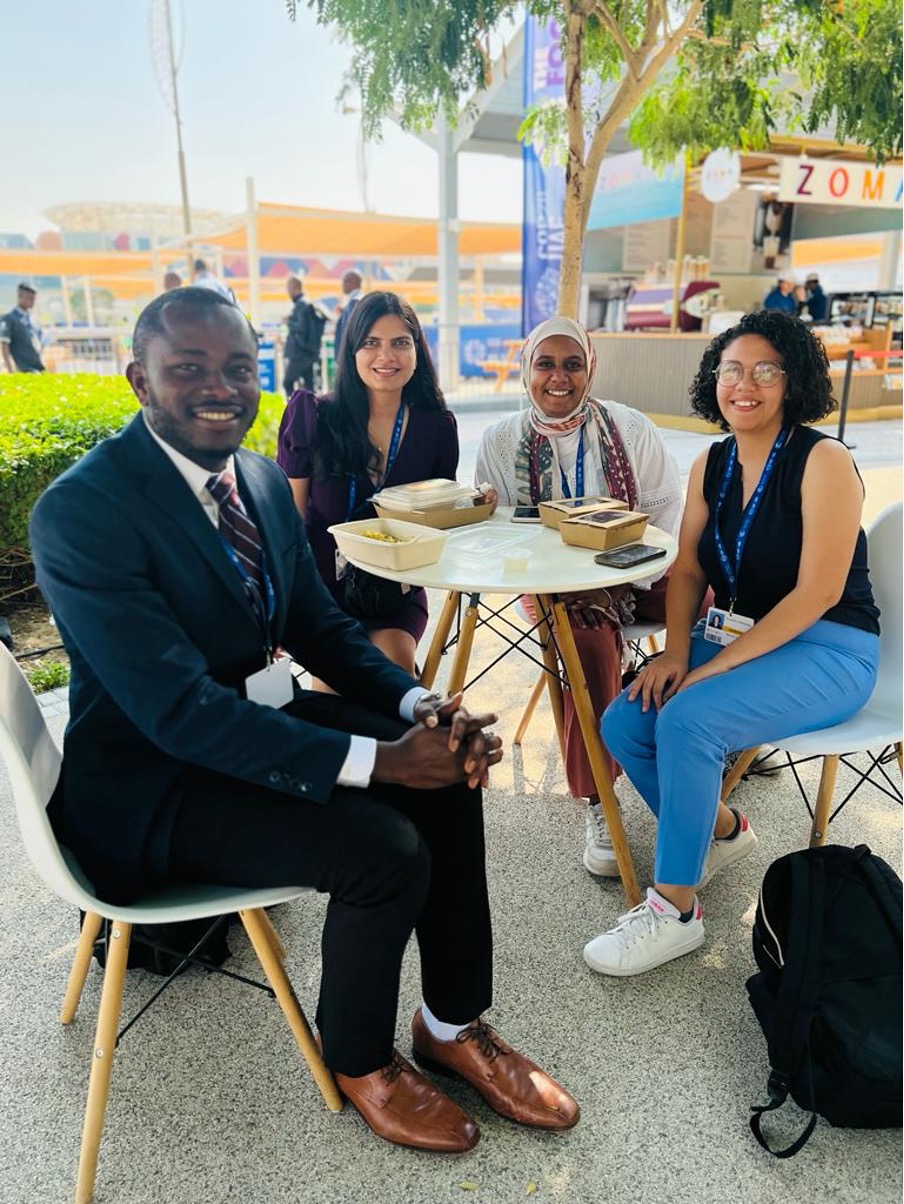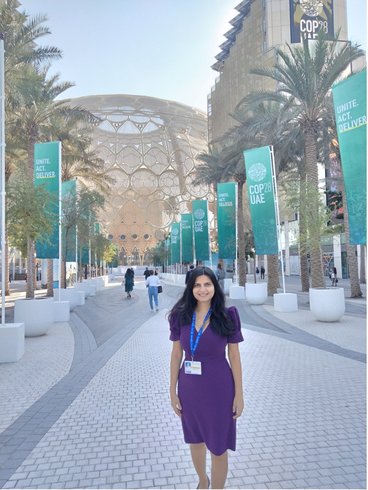Suman Lata is a PhD student in Bioproducts and Biosystems Engineering. Her research focuses on waste remediation for renewable energy, specifically remediation of PFAS from soil and water systems to mitigate environmental impact.

Last week, I had the privilege of attending COP28 in Dubai. I was fortunate to attend as part of the University of Minnesota’s observer delegation, joining around a dozen students from various schools at the University. The theme for this year's COP28 revolved around 'Unite. Act. Deliver.' Approximately 85,000 individuals participated in the two-week program, including Party delegates, industrialists, scientists, youth, and observers. As a first-time attendee and a grad student focusing on sustainable systems and waste remediation, I found this immersive experience fascinating and rewarding, learning from global peers leading the fight against climate change and human rights.
This marked the 28th gathering where world leaders and negotiators convened to discuss human-caused climate change. Much of the conference focused on the 'loss and damage' fund, which aims to help compensate vulnerable nations for the impact of climate change, by ensuring that vital infrastructure can be rebuilt or replaced with more sustainable versions.
This year's COP saw an enormous scale, with 198 parties joining hands to address climate change. The venue (Expo City 2020) covered an area of 1080 acres. Half of the venue hosted UN negotiations where diplomats deliberated over global agreements; the other half accommodated various pavilions, thematic arenas, side events, and exhibits. Amidst this, passionate activists marched and protested, demanding that human rights, equity, and climate justice remain central in all COP discussions.
I attended the conference during its second week, where numerous high-level talks unfolded rapidly. One of the most intriguing pavilions I visited was dedicated to Food and Agriculture. This pavilion served as a platform for collaborative dialogue, knowledge sharing, and decision-making concerning the unique role of agriculture and food systems in the fight against climate change. Several speakers highlighted the necessity of transforming food systems for the benefit of people, nature, and climate, advocating increased investment in climate-smart agriculture and innovative food system practices. They also emphasized that the agrifood system plays a pivotal role in climate action by fostering resilience, aiding in climate change adaptation, reducing GHG emissions, and simultaneously safeguarding biodiversity while ensuring food security for all.

COP28 helped me realize the interconnectedness of different perspectives such as science and technologies, indigenous knowledge, and local wisdom, emphasizing their significance in combating climate change. The motivation among attendees was palpable, and meeting inspiring individuals of all ages and genders, from children to elders, was truly uplifting. One of the most poignant moments for me was hearing an 80-year-old indigenous individual passionately speak about climate injustice. Their fervor for change for future generations was inspiring, emphasizing the role of indigenous knowledge in biodiversity conservation and the interconnectedness of social injustices with climate goals, leaving a profound impression on me.
My experience at COP28 was incredibly enlightening, exposing me to a multitude of diverse perspectives within a short period. The conference emphasized the profound impact of climate change on nations, acknowledging its disproportionate effects while highlighting the inherent challenges in achieving swift global change through collective action. Furthermore, this year's COP recognized that effective climate action should not solely concentrate on reducing emissions but also prioritize transitioning towards low-carbon economies and societies. The central focus remained on bolstering resilience by advocating the adoption of cleaner technologies. A significant historic milestone from COP28 was the agreement to triple renewable energy capacity and double energy efficiency. This pivotal move underscores the acknowledgment of the urgent need to phase out fossil fuels, which are the primary drivers of climate change.
Observing COP28 was a transformative experience that significantly influenced both my approach to PhD research and my career trajectory. My research in Bioproducts and Biosystems Engineering focuses on waste remediation for renewable energy, which is pivotal in combating climate change.
It has reshaped my vision, propelling me to navigate my PhD work and future career path with a deeper understanding of the interconnectedness and importance of addressing multifaceted challenges related to climate change.